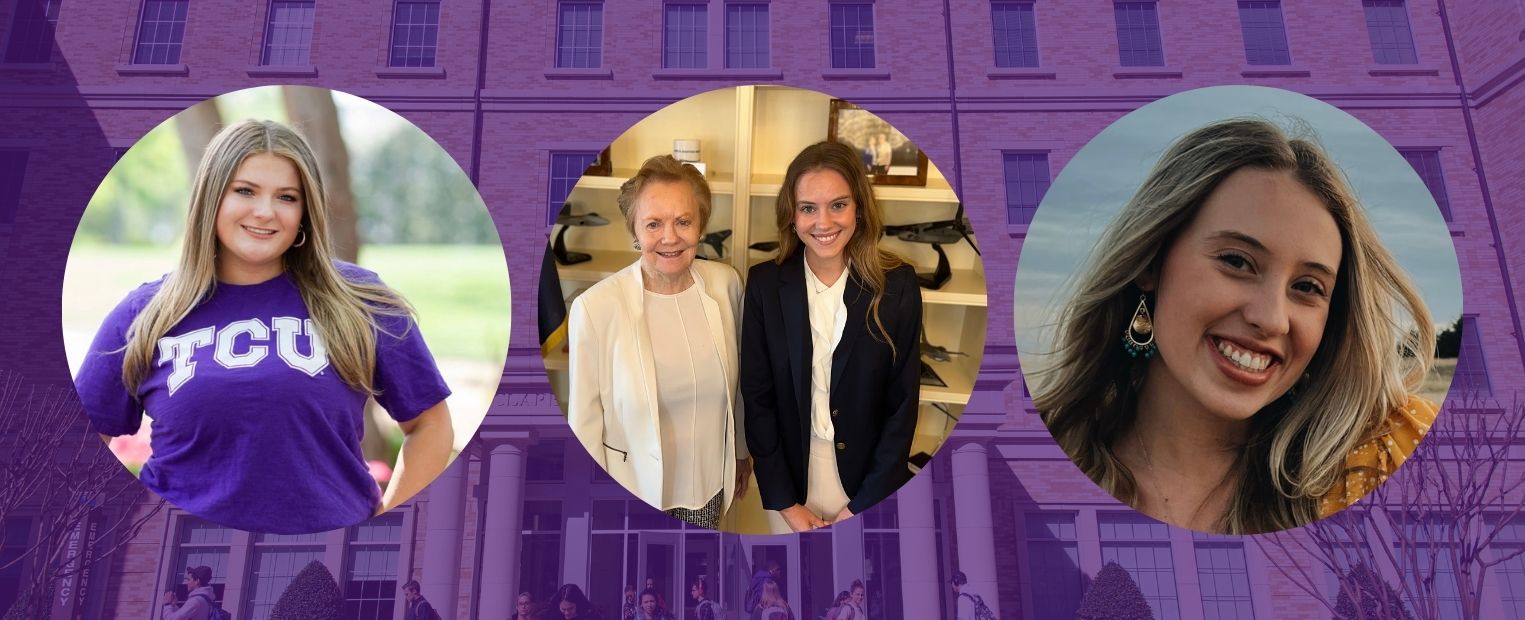Summer 2024 was a season of growth, exploration and achievement for many AddRan College of Liberal Arts students who gained valuable real-world training during internships with government entities, nonprofit organizations and many more fields.
Four students share their summer experiences and takeaways in part one of our two-part internship series below. Read part two.
Alexa Gerdes
Gerdes, a junior criminology & criminal justice and psychology double-major from Dodge City, Kansas, interned with Emily Fallis, Ph.D., at Balance Forensic & General Psychological Services, Inc. this summer.
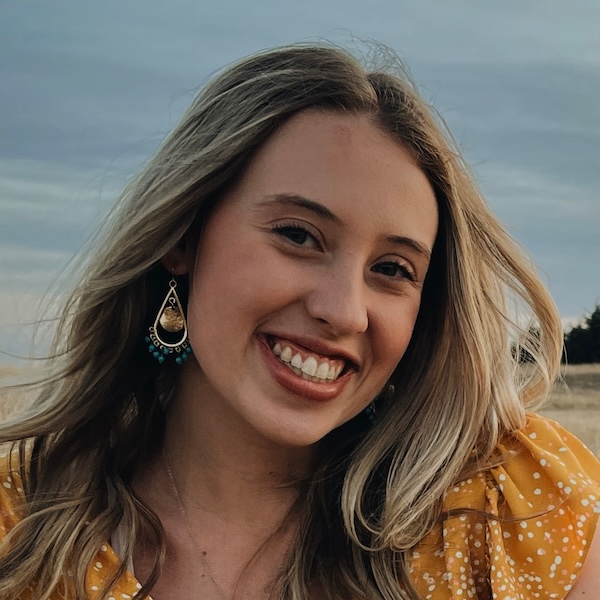
Q: How did your AddRan classes help to prepare you for your internship?
A: Going into my internship, I had valuable knowledge of the criminal justice system from my AddRan classes. I was prepared to understand different legal terms and apply them to court-ordered competence evaluations. My criminological theory class taught by Kendra Bowen, Ph.D., prepared me for this internship as she was the one who connected me with Dr. Fallis. In that class, social learning theory and strain theory were major concepts that I applied to the psychological background of a defendant during my internship.
Q: What were your key responsibilities?
A: The responsibilities of my internship were conducting collateral interviews on a defendant to gain a more thorough background and to observe the various types of testing that are used in a forensic setting. I researched specific ethical standards of forensic psychology and shadowed Dr. Fallis on cases of competency, insanity, juvenile certification and fitness for duty.
Q: What is the most valuable thing you learned during your internship?
A: The most valuable thing I learned at my internship is the vital role a forensic psychologist plays in the legal system. A forensic psychologist is tasked with deciding the competence of a defendant and making treatment recommendations for the court among their many court-ordered duties. The valuable understanding of mental health within our criminal justice system is a key takeaway from my experience as a forensic psychology intern.
Q: How has your internship prepared you for your future career and/or continuing education?
A: This internship allowed me to gain a deeper insight into the psychological side of our legal system. During my time evaluating defendants, I have solidified my future career and plan to pursue a Ph.D. in clinical psychology with a focus on forensic work once I graduate from TCU. I am prepared to understand the current research of forensic psychology and conduct my own once I am in graduate school.
Ivy LaFlamme
LaFlamme, a senior criminology & criminal justice major with a double minor in social work and child development from Dallas, served as a student volunteer at the Dallas Children’s Advocacy Center this summer.
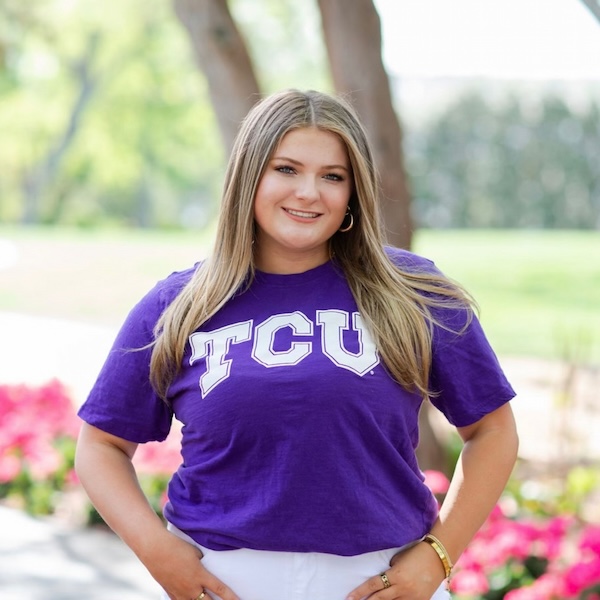
Q: How did your AddRan classes help to prepare you for your internship?
A: I believe that my AddRan courses helped me tremendously by providing me with knowledge in all areas of criminal justice. At the Dallas Children’s Advocacy Center, they use a multidisciplinary approach to address cases of abuse involving Child Protective Services, the Dallas Police Department, district attorneys, family advocates, therapists and forensic interviewers. They deal with cases that rise to a criminal level, which can include extreme physical abuse, sexual abuse, witness to a homicide or human trafficking.
My courses in AddRan have covered the range of professions and how each field is essential to the criminal justice system. The information I learned in these classes helped me understand the process of dealing with a criminal case and all the elements that are involved, especially in a case involving minors.
Q: What were your key responsibilities?
A: My key responsibilities were interacting and watching over the children in the activity center, where they wait before or after a therapy session or a forensic interview. This is a sensitive time when these children can be very emotional or on edge, so I offer them opportunities to color, play, interact with other children, have a snack, talk with me or have some alone time.
Q: What is the most valuable thing you learned during your internship?
A: The most valuable thing that my internship taught me is how to interact with children who are victims of abuse or have endured trauma. It is important to allow each child to have control over themselves because in a lot of cases they have had that control stripped from them. We never force a child to play or talk; we allow them to decide what they feel like doing. That is important because they have been in therapy or a forensic interview, most likely being forced to share things that are difficult.
Q: How has your internship prepared you for your future career and/or continuing education?
A: This experience tremendously helped prepare me for my future career and continuing education. It inspired me to obtain my master’s degree in social work after I graduate from TCU next year. I have been able to see how important recovery is for victims and all the amazing things that the Dallas Children’s Advocacy Center does for these children.
Jaxon Weber
Weber, a senior criminology & criminal justice major from Carrollton, Texas, interned with the Texas Department of Public Safety State Troopers for three weeks during the summer.
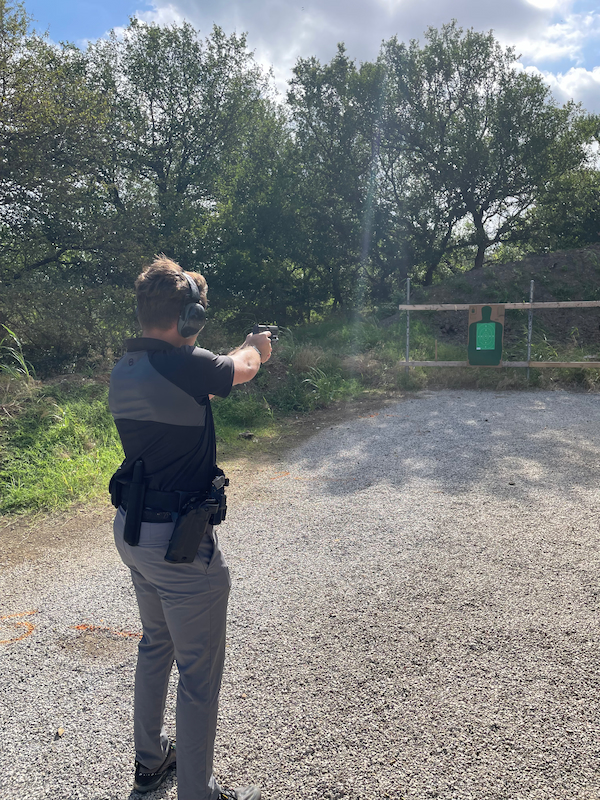
Q: How did your AddRan classes help to prepare you for your internship?
A: I came into this internship with a good understanding of the law, how criminals may think and why they do what they do. My crime scenes class was the most helpful since state troopers work on crash scenes. I already went into that part of the job with a good understanding of what is expected.
Q: What were your key responsibilities?
A: My main responsibility with Corporal Rogers was to make sure I always had my head on a swivel during stops, so both of us and the person being stopped were safe. I got first-hand experience with how interactions normally go when pulling someone over and learned how to do a crash investigation and fill out the report. It was a very hands-on internship and solidified my hopes of becoming a state trooper.
Q: What is the most valuable thing you learned during your internship?
A: I learned that law enforcement officials have no room for bad days; no matter how rough your day is or an interaction is, you have a reputation to uphold.
Q: How has your internship prepared you for your future career and/or continuing education?
A: It showed me exactly what to expect as a state trooper and gave me an idea of elective classes to take to help my understanding of people.
Ava Valdes
Valdes, a junior sociology and economics double major and Honors College student from Austin, Texas, interned for eight weeks this summer with U.S. Rep. Kay Granger.
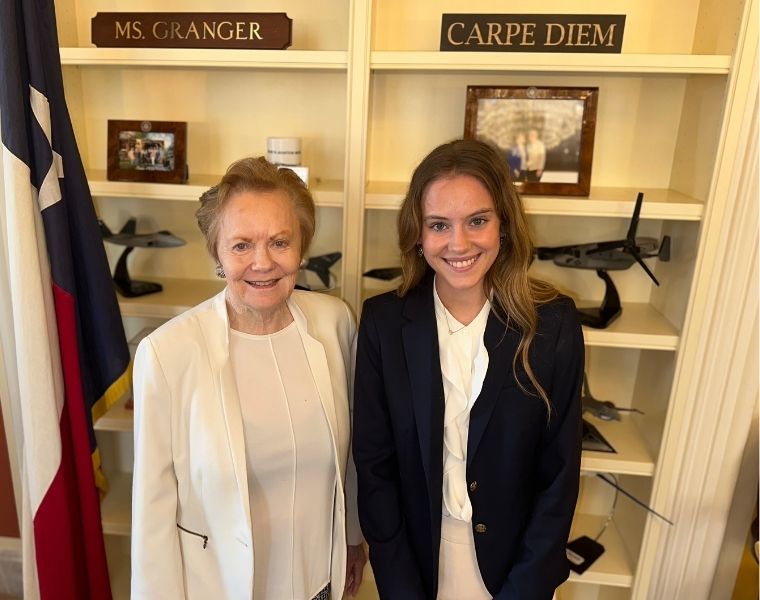
Q: How did your AddRan classes help to prepare you for your internship?
A: While on Capitol Hill, I used my AddRan knowledge every single day. At first, I didn’t think my sociology and economics mindset would translate to my internship, and I assumed there would be a learning curve. While there was a learning curve, I relied heavily on my sociologist and economist mindset to navigate my work. I feel this is the beauty of a liberal arts degree: it translates across a wide variety of fields.
With the hustle and bustle of Congress, I was extremely grateful to have developed soft skills to aid with co-sponsoring memos, analyzing documents and researching active legislation.
Q: What were your key responsibilities?
A: My day-to-day tasks varied greatly based on the needs of the congresswoman, the legislative staff and the House of Representatives. My primary responsibilities included answering constituent phone calls, responding to mail, researching legislation, writing briefs, co-sponsoring memos and attending hearings.
Q: What is the most valuable thing you learned during your internship?
A: Interning in the House of Representatives taught me how to maximize the rest of my time as a student. I learned so much about who I am — my strengths, weaknesses and interests. Now that I have had this period of self-reflection, I can take advantage of the great resources TCU has to offer to enhance my résumé and further cultivate my skill set.
Q: How has your internship prepared you for your future career and/or continuing education?
A: My internship has prepared me for my future career by adding direction. Like a lot of liberal arts students, my areas of interest span across the board. Within AddRan, I had the opportunity to double major and pursue two areas of interest simultaneously. My time on the Hill taught me how I can combine my interests and showed me countless career opportunities that work well with my degree plan.
